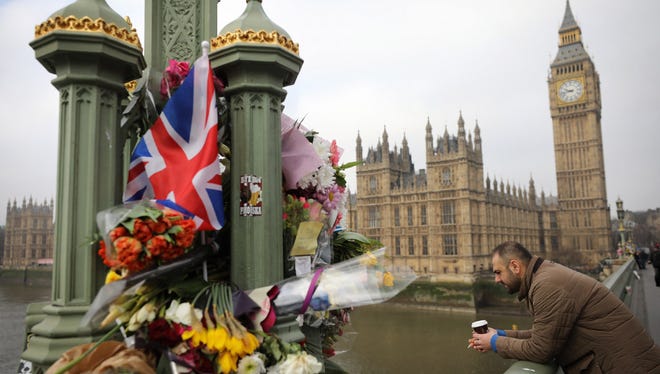Facebook, Google, Twitter pressured to do more to fight terrorism on platforms

SAN FRANCISCO — Google, Facebook and Twitter are facing pressure from British lawmakers who say the Silicon Valley companies have done too little to combat terrorists on their digital networks.
In the wake of last week's London terror rampage, British officials say they plan to meet with the three companies this week to urge them be more proactive.
Internet companies are facing growing scrutiny in Europe over how they police terrorist propaganda and, increasingly, over their refusal to give authorities a "backdoor" to decrypt private communications by suspected terrorists.
The meeting, scheduled for Thursday, comes after Amber Rudd, the U.K. home secretary, said companies must more quickly take down hate videos and must give access to encryption technology so intelligence agencies can view private messages sent on services such as WhatsApp, which is owned by Facebook.
Khalid Masood, who police say killed four people on Westminster Bridge and at the U.K. Parliament in London last week, used WhatsApp shortly before the attack but security services cannot access the message.
ISIS claimed responsibility for the attack, calling him a "soldier of the Islamic state," but U.K. officials say he had no known links to ISIS or al-Qaeda. They haven't determined how Masood became radicalized.
"Each attack confirms again the role that the Internet is playing in serving as a conduit, inciting and inspiring violence, and spreading extremist ideology of all kinds," Rudd wrote in theSunday Telegraph.
"But we can’t tackle it by ourselves … We need [social media companies] to take a more proactive and leading role in tackling the terrorist abuse of their platforms."
U.K. Foreign Secretary Boris Johnson told the The Sunday Times the failure of Google and other Internet platforms to remove terrorist content was "disgusting." “They need to stop just making money out of prurient violent material," he said.
European officials say digital platforms must step up because they play a key role in the growing wave of terrorism including attacks in Nice, France and last week in London.
Terrorist groups such as the Islamic State — also known as ISIL or ISIS — use popular Internet services such as YouTube, Twitter and Facebook to spread propaganda, attract and train new recruits, celebrate terrorist attacks and publicize executions. They also use messaging services to communicate.
Google, YouTube boycott over extremist ads slams shares
British officials declined to release details of the meeting with Internet companies.
Rudd told Sky News television Sunday that when she meets with the Internet company executives, "they’re going to get a lot more than a ticking off."
Twitter and Google declined to comment. Facebook could not be reached for comment.
WhatsApp in an emailed statement said: "We are horrified at the attack carried out in London and are cooperating with law enforcement as they continue their investigations.”
In a BBC interview on Sunday, Rudd said it was "completely unacceptable" that intelligence authorities did not have access to the messages. "We need to make sure that our intelligence services have the ability to get into encrypted services like WhatsApp," she said.
Rudd also took aim at smaller Internet players, too, such as messaging service Telegram, JustPaste.it, a free service that allows users to share text, images and video, and Wordpress.com, an online publishing system.
Terrorist attacks have hardened the resolve of European lawmakers like Rudd to pressure tech companies to take more responsibility for the content on their networks and in providing information to authorities that could help them foil or investigate attacks.
In August, a report by a panel of lawmakers in the U.K. Parliament's Home Affairs Committee accused Facebook, Google and Twitter of shirking their duty to combat terrorism.
Earlier this month Heiko Maas, Germany’s minister of justice and consumer protection, said he would propose legislation that would level fines on any social media company that did not respond quickly enough to hate speech and other online content that violates his country's stringent rules.
Major brands and advertisers such as AT&T and Verizon said last week they pulled their business from Google and YouTube after learning their brands may have appeared alongside videos promoting terrorism and other offensive content. That means those ads will no longer run on YouTube or the two million websites that take part in Google's ad network, resulting in hundreds of million in lost sales.
Last year, the U.K. passed legislation that gave law enforcement greater authority to retrieve information from technology companies.
Related:
The $80B business that linked all-American brands with hate content
London terror attacker used WhatsApp, the encrypted messaging app, before rampage